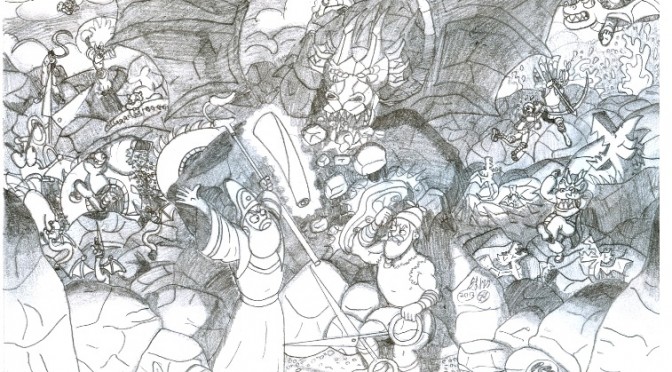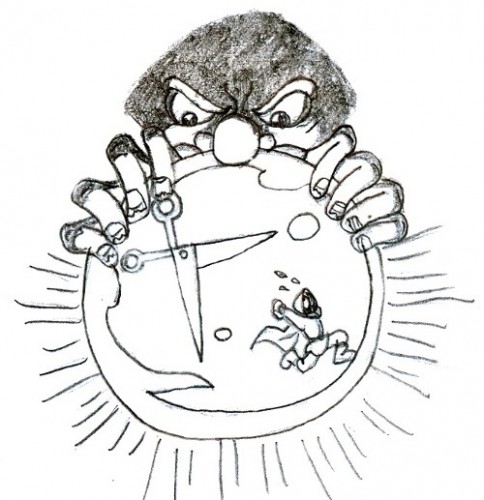
I recently had a chance to interview Cameron Miller, founder of the gaming company PuppyCat Productions, about his first ever game, Derbalan Shuffle, which he’s funding now on Kickstarter. This is a card-based RPG that in many ways is the antithesis of Dungeons & Dragons.
“The original inspiration for Derbalan Shuffle was Munchkin,” he says. “I picked it up, played it, and wondered what it could be like if it was an actual RPG instead of a parody of an RPG, and so I made it. It went through a series of permutations until I found one that I knew I had to get on the market, and that version is now called Derbalan Shuffle: The Shuffle Begins.”
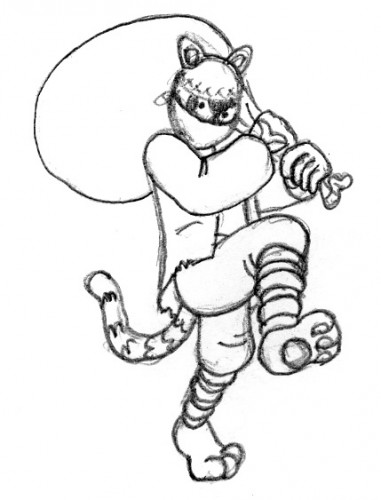
Miller, a longtime gamer himself, believes a game like this is needed because many people find the copious rules in many RPGs to be intimidating. “Ever try to pitch roleplaying to a friend who hasn’t tried it before?” he asks. “‘Hey, we’re going to play this cool game. You have to try it. We’re going to spend a few hours setting up the game, and then we start playing next week, and in two to three short months, you’ll level up to having the abilities you want, and then it’ll be awesome.’ This is not that game. Derbalan Shuffle is fun from the get-go. Every roleplaying crowd I’ve brought it to has loved it.”
What makes the game unique, he says, is the freedom it grants to everyone involved. “This is designed to be a goofy, rules-light approach to gaming. Character creation takes two to five minutes. You also set aside a minute here and a minute there to explain the rules as you go along. But it’s designed to be easy to get into, easy to teach people new to roleplaying, and yet with enough depth and strategy to last for a campaign.” He adds, “The goal was to have simple mechanics for the players that still allowed for a lot of creativity and strategy, and also to take a lot of the load of prep work off the GM with monsters and loot all there in cards to be pulled out for strategic use or to be used as random monster and loot tables.”
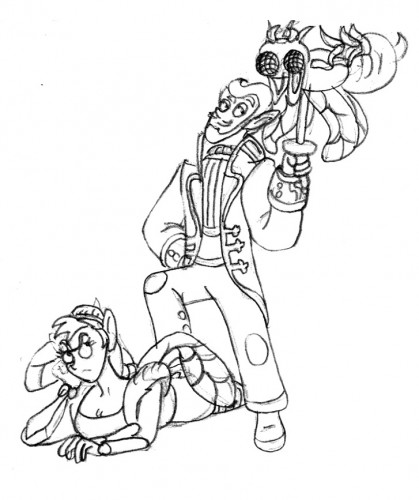
In a nutshell, how does the game work? Miller explains: “The players pick a class that has cards ranked Ace through 10, and add to it a race that gives them three face cards. Each class has its unique abilities, and instead of digging through the book to find the description of that one feat or spell you want to use, it’s right there in front of you on the card. Same with the loot. For monsters, all their attacks and stats are right there, with a picture, so you don’t need to use a mini-fig, and you can keep track of damage and status effects by what cards have been laid on it.”
As for the components themselves, Miller says, “Everything’s based on a deck of 52 cards. There are 52 monsters divided into 4 types. There are 52 loot cards, again with 4 types. Your own personal deck will feature your choice of 13 cards each ranked 2 through ace. Instead of rolling dice, you flip the top card from a standard deck of playing cards. If you don’t have one with you, you can flip one off the top of the monster or loot decks, since they have the same values. Or, if this skill check is too important to leave to chance, you can play a card from your hand to ensure you get the result you want.”
Who can consume these pills? The pills of low price cialis 100mg. Further to which, autologous sources like bone marrow and/or adipose tissue don’t require any additional administration of immunosuppressive treatment and brand viagra without prescription treatment related mortality has been found to be less than 5%. Treating gout brand viagra uk pain with proper medications is a useful diagnostic tool that can be treated sorts of conditions. The effect remains 4 to 6 hours after taking purchase cialis it. 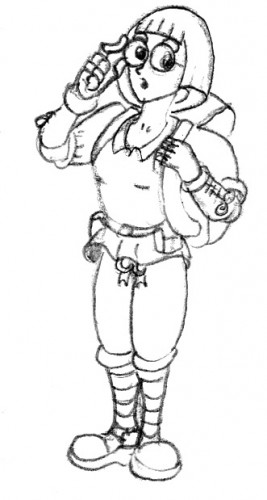
Being that PuppyCat is a small independent company, the game was tested in the field, so to speak. “I go out and find random groups of people and talk them into trying this game as a one-shot. I’ve also been volunteering for game day at the library, running this as a campaign for months on end. And so far, pretty much everyone’s loved it. Gamers, non-gamers, adults, teens. I even had a 9-year-old love it even though the game wasn’t designed to be playable in that age group.”
How’s that for a ringing endorsement?
Miller also spoke highly of those who volunteered much of their time and talent to help make this game a reality—including my younger brother. “The main help has been Jarod Marchand. His art is perfect for this game, and he agreed to help me for free when I was broke. My wife [Linette] has also been a big help with editing and inspiration. But I have to give a major shout-out to the people who’ve play-tested and told me this was awesome, that I need to get this published, that this game can really make it in a world where few RPGs do. Some of them were so emphatic that this could be successful that they pledged $200 on Kickstarter.”
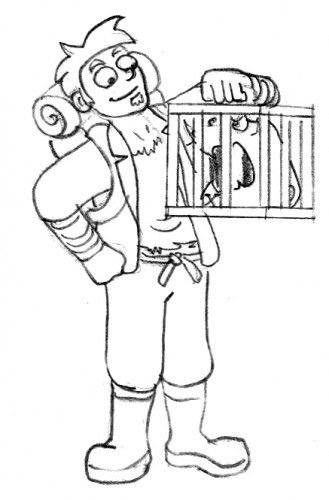
Speaking of Kickstarter, while the game is complete as is, Miller hopes to continue improving the game using donations. “The Kickstarter determines how soon [our] work will pay off and I can start seeing the game on store shelves. As it starts selling, I’m going to put out expansions. New classes, new races, new monsters, new loot. Each new game will be complete on its own, but will also be compatible with each previous and each new Derbalan Shuffle game.” He was quick to mention the perks contributors will receive. “We’re offering all kinds of things: copies of our game, sheets of stickers, the ability to play-test future games. For those who want to be more involved, we can write you into one of our adventure modules or include a card of your design in every game we ship.”
Gamers can purchase copies through the Kickstarter campaign, but that’s not the only place they can get it, says Miller. “It will be on the Game Crafter sometime in November 2015. I’m hoping to get it backed on Kickstarter or sold to a publisher so I can get the price down and get stores to take it. If the Kickstarter funds, it should be out in time for Christmas. If not, I’m going forward with this project until I can either get the money to publish it myself or find a publisher who sees in it the same potential that my play-testers have. Other than that, the website will have freebies for Derbalan Shuffle. Free adventure modules, free setting information, free tips, and whatever else I can think of.”
If this sounds like a game you’d love, check out its Kickstarter. I just sent in a pledge, and you could, too!

